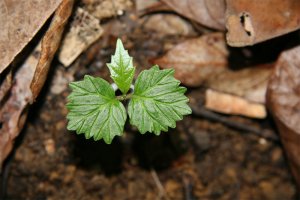Presented By: Ecology and Evolutionary Biology
EEB Thursday Seminar: What is the role of phenotypic differentiation, if any, for explaining species abundances in tree communities?
María Natalia Umaña, University of Maryland

Abstract
Natural communities are composed of a few common and many rare species. This pattern is one of the few universal rules in ecology and is especially pronounced in species-rich ecosystems, where most of the species display extremely low
abundances. Although there is a long-standing interest in this pattern and the
development of ecological and statistical models, there is still no consensus. Here I argue that differences between species and individuals in their phenotypes are
fundamentally important for understanding the drivers of species abundance. I
provide evidence to support this argument from my research concerning patterns of species abundance in tropical tree communities. The work uses statistical models to interrogate species and individual-level trait information with respect to abundance in natural communities from Asia and the Americas. The results show that (1) the species and trait composition of plant communities is driven by a combination of opposing ecological forces acting on intra- and inter-specific levels and that this ultimately results in differential species abundances; (2) The magnitude of the phenotypic variation in natural assemblages is variable itself across species and related with species relative abundance; (3) Rare species tend to occupy the periphery of the functional space of local communities. Overall, my results indicate that phenotypic differences are key for our understanding of how species-environment relationships produce differential demographic rates that ultimately drive differential species abundance. Furthermore, ecological interactions occur at the individual level and considering individual-level trait information, which is frequently ignored in trait-based ecology, in the context of community assembly opens a new avenue of research for addressing foundational questions in ecology.
Light refreshments served at 4 p.m.
View YouTube video of seminar: https://youtu.be/5GE1q31A4jc
Natural communities are composed of a few common and many rare species. This pattern is one of the few universal rules in ecology and is especially pronounced in species-rich ecosystems, where most of the species display extremely low
abundances. Although there is a long-standing interest in this pattern and the
development of ecological and statistical models, there is still no consensus. Here I argue that differences between species and individuals in their phenotypes are
fundamentally important for understanding the drivers of species abundance. I
provide evidence to support this argument from my research concerning patterns of species abundance in tropical tree communities. The work uses statistical models to interrogate species and individual-level trait information with respect to abundance in natural communities from Asia and the Americas. The results show that (1) the species and trait composition of plant communities is driven by a combination of opposing ecological forces acting on intra- and inter-specific levels and that this ultimately results in differential species abundances; (2) The magnitude of the phenotypic variation in natural assemblages is variable itself across species and related with species relative abundance; (3) Rare species tend to occupy the periphery of the functional space of local communities. Overall, my results indicate that phenotypic differences are key for our understanding of how species-environment relationships produce differential demographic rates that ultimately drive differential species abundance. Furthermore, ecological interactions occur at the individual level and considering individual-level trait information, which is frequently ignored in trait-based ecology, in the context of community assembly opens a new avenue of research for addressing foundational questions in ecology.
Light refreshments served at 4 p.m.
View YouTube video of seminar: https://youtu.be/5GE1q31A4jc
Explore Similar Events
-
Loading Similar Events...
